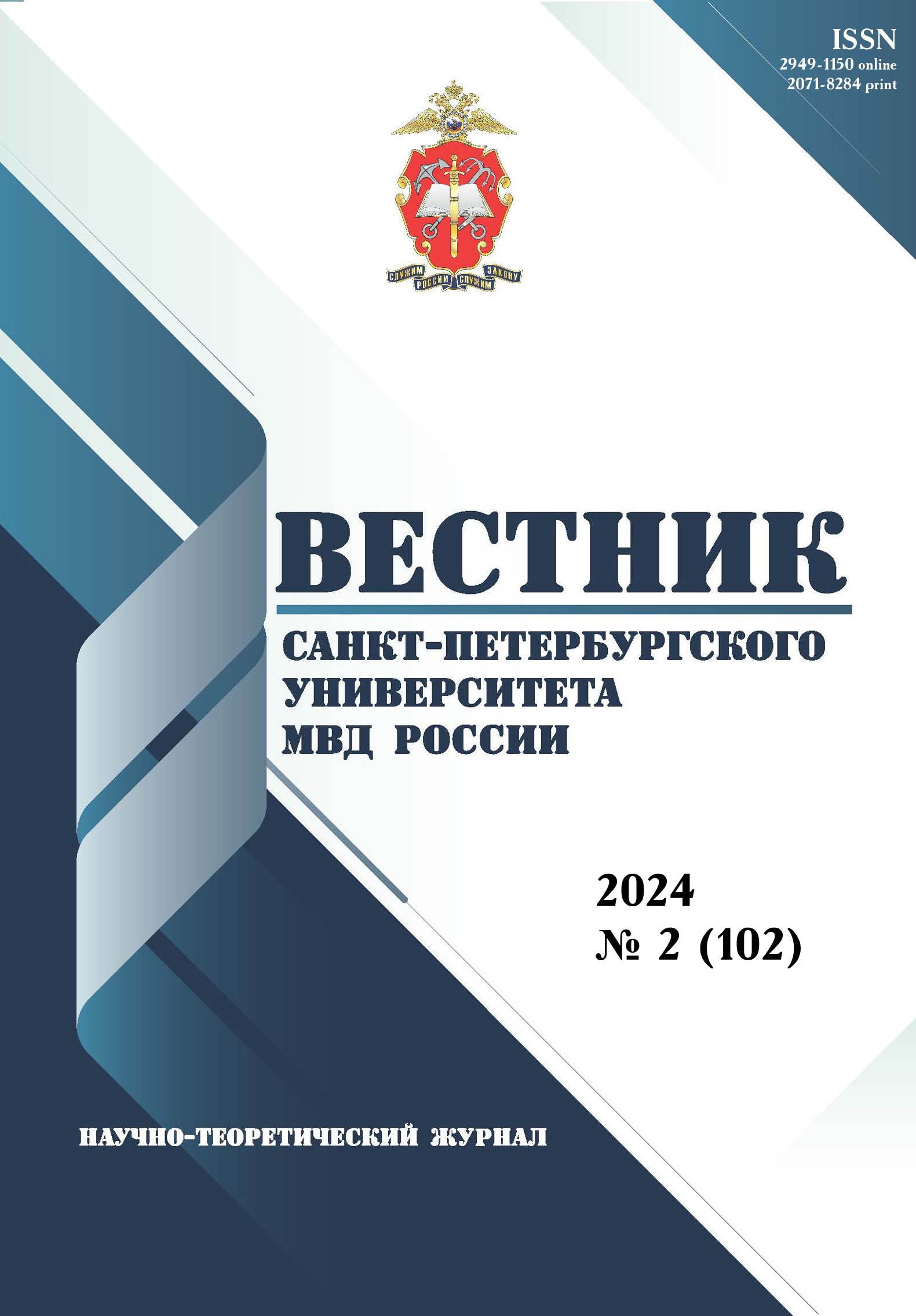Southwest State University
Russian Federation
Kaliningrad, Kalinigrad, Russian Federation
UDC 343.85
CSCSTI 10.81
Russian Classification of Professions by Education 40.00.00
Russian Library and Bibliographic Classification 6751
Russian Trade and Bibliographic Classification 7587
BISAC LAW026000 Criminal Law / General
Introduction. Control over the behaviour of employees is an important form of implementation of anti-corruption legislation. The research reveals shortcomings in the legal definition of the concept of “corruption”, considers corrupt behaviour, the mechanism of public control at the stage of revealing illegal profits in the form of gained property. The need to improve control functions in case of conflict of interest and personal interest of employees in the form of a special public preventive impact on corruption was established. The need for a system of control over the compliance with prohibitions and restrictions for employees, as well as the need for public monitoring for the timely detection of illicit enrichment on the part of employees in the framework of anti-corruption was substantiated. Methods. The authors used various methods of knowledge: dialectical, statistical, analytical, and questionnaire survey methods. The research material was based on case studies, normative legal acts, statistical data, as well as scientific works of authors studying the problems of public control in anti-corruption work. Results. A new mechanism of digital public control should be actively introduced into the modern system of counteracting illicit enrichment of employees. This will require providing the public with access to the Poseidon system. Corrupt behaviour should become disadvantageous to an employee, destroying his/her professional reputation and the possibility of further professional activity in the authorities.
corruption, presumption of illegality of proceeds, digital forms of control
1. Serdobintsev K. S., Sharun V. V., Popov S. V. Metodologicheskiye osnovy i problemy otsenki effektivnosti deyatel’nosti organov vnutrennikh del // Vestnik Kaliningradskogo filiala Sankt-Peterburgskogo universiteta MVD Rossii. – 2021. – № 1 (63). – S. 23–27.
2. Dalgatova A. O. Obshchestvennyy kontrol’ kak mekhanizm protivodeystviya korruptsii v organakh publichnoy vlasti // Yurist»-Pravoved». – 2015. – № 5 (72). – S. 29–32.
3. Shalamova A. N., Naryshkin P. A. Rol’ obshchestvennogo kontrolya i yego institutov v mekhanizme protivodeystviya korruptsii // Vestnik Vostochno-Sibirskogo instituta MVD Rossii. – 2018. – № 4 (87). – S. 39–45.
4. Farakhiyev D. M. Obshchestvennyy kontrol’ i monitoring v protsesse protivodeystviya korruptsii // Nauchnyy vestnik Omskoy akademii MVD Rossii. – 2023. – T. 29, – № 1 (88). – S. 18–21; https://doi.org/10.24412/1999-625X-2023-188-18-21.
5. Dolgova A. I. Izbrannyye trudy / sostaviteli: V. V. Merkur’yev, O. A. Yevlanova, A. S. Vasnetsova, D. A. Sokolov ; vstupitel’naya stat’ya M. P. Kleymenova, V. A. Nomokonova, E. F. Pobegaylo, V. Ye. Eminova. – Moskva: Akademiya General’noy prokuratury Rossiyskoy Federatsii, 2017. – 424 s.
6. Zablotskaya A. G., Alekseyeva A. P. Znacheniye tochnogo opredeleniya ponyatiya korruptsii dlya bor’by s ney / Organizovannaya prestupnost’, terrorizm, korruptsiya v ikh proyavleniyakh i bor’ba s nimi : sbornik statey / Redkollegiya: A. I. Dolgova (otv. red.), O. A. Yevlanova, A. A. Panenkov, Ye. M. Yutskova. – Moskva: Rossiyskaya kriminologicheskaya assotsiatsiya, 2005. – S. 166–168.
7. Iliy S. K. Analiz osnovnykh tendentsiy korruptsionnoy prestupnosti v Rossii // Vserossiyskiy kriminologicheskiy zhurnal. – 2016. – T. 10. – № 3. – S. 531–543; https://doi.org/10.17150/2500-4255.2016.10(3).531-543.
8. Sosnovskaya Yu. N., Bondar’ Ye. O. Obshchestvennyy kontrol’ kak administrativnopravovoy mekhanizm v sfere protivodeystviya korruptsii v territorial’nykh organakh MVD Rossii // Vestnik Vserossiyskogo instituta povysheniya kvalifikatsii sotrudnikov Ministerstva vnutrennikh del Rossiyskoy Federatsii. – 2023. – № 3 (67). – S. 61–66; https://doi.org/10.29039/2312-7937-2023- 3-61-66.
9. Tarasov A. M. O zakonodatel’nom obespechenii gosudarstvennogo kontrolya za deyatel’nost’yu organov ispolnitel’noy vlasti (pravookhranitel’nykh organov) // Trudy Akademii upravleniya MVD Rossii. – 2019. – № 1 (49). – S. 14–25.
10. Bavsun M. V., Stebeneva Ye. V. Transformatsiya lichnosti prestupnika v postindustrial’nom obshchestve // Vserossiyskiy kriminologicheskiy zhurnal. – 2023. – T. 17. – № 4. – S. 340–351; https://doi.org/10.17150/2500-4255.2023.17(4).340-351.
11. Bavsun M. V. Antropologicheskiye predposylki formirovaniya sovremennoy ugolovnoy biopolitiki // Rossiyskiy deviantologicheskiy zhurnal. – 2021. – № 1 (1). – S. 39–50; https://doi.org/10.35750/2713-0622-2021-1-39-50.
12. Buberbayev N. D. Mezhdunarodnyy opyt obshchestvennogo kontrolya nad deyatel’nost’yu politsii kak faktor protivodeystviya korruptsii v ney // Vestnik Karagandinskoy akademii Ministerstva vnutrennikh del Respubliki Kazakhstan im. Barimbeka Beysenova. – 2015. – № 2. – S. 29–32.
13. Vikhryan A. P., Fedorov M. V. Antikorruptsionnoye prosveshcheniye kak faktor obespecheniya sotsial’noy bezopasnosti // Vestnik Rossiyskogo universiteta druzhby narodov. Seriya: Sotsiologiya. – 2020. – T. 20. – № 4. – S. 967–976; https://doi.org/10.22363/2313-2272-2020-20-4-967-976.
14. Vorodyukhin S. Ye. Korruptsiya kak sotsial’noye yavleniye i mery bor’by s ney // Vestnik Belgorodskogo yuridicheskogo instituta MVD Rossii imeni I. D. Putilina. – 2020. – № 4. – S. 42–47.
15. Zheludkov M. A. Problemnyye voprosy zashchity prav i zakonnykh interesov lits, postradavshikh ot prestupleniy // Lex Russica (Russkiy zakon). – 2019. – № 2 (147). – S. 81–91; https://doi.org/10.17803/1729-5920.2019.147.2.081-091.















